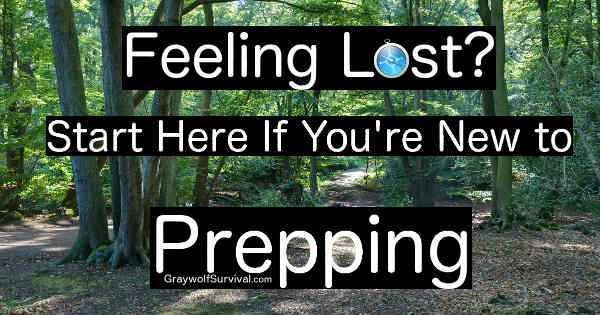 If you are brand new to prepping, then this article is for you. It is intended to give those who are just starting out an idea of how to approach preparedness without feeling overwhelmed or lost. It is also a way to avoid many mistakes I see people new to prepping make.
If you are brand new to prepping, then this article is for you. It is intended to give those who are just starting out an idea of how to approach preparedness without feeling overwhelmed or lost. It is also a way to avoid many mistakes I see people new to prepping make.

This is just an overview of what you need to do to begin. But there are MANY useful links throughout this article that will help you with much more detail. Read them at your leisure.
So now that you are ready to get started, the first thing you need to have, above ANYTHING else, is the right mentality. All the gear and supplies in the world won’t help you if you lack the survival mind set. If you are brand new and reading this article, then that is a step in the right direction. You hopefully realize that your safety and security is ultimately YOUR responsibility.
Some people might dismiss “mind set”, thinking they will be just fine. Don’t. I have seen firsthand times where people were caught in tragic events, panic set in, and they simply “locked up”. I’ll spare you the details of how the mind and body reacts physiologically in times of high stress. Just know that developing the right mind set is the most important thing you can do.
As time goes on, and you gather supplies and hopefully develop some skill sets, you will find that your “mind set” will grow and develop as well. Nothing builds confidence like learning new skills and then seeing those skills in action.
“Ok” you say….”I’m working on that. Now what?”
Like I said, let’s start slow. No need to get overwhelmed, or feel that you need to be prepared for the apocalypse by tomorrow. You don’t.
The first thing you should do is develop a plan. Based upon your location and conditions, what sort of emergencies could you see happening in your area? Are you on a coast that has a chance of a hurricane? Are winter storms likely to happen in your area? What about earthquakes? Do you live on a flood plain? Is there a nuclear reactor in your area?
These are questions YOU have to answer. Identify emergency events that could happen in your area, and then base your plans accordingly.
I live in Oklahoma, so I’m not really worried about hurricanes. But tornadoes and ice storms here are a way of life. I have made contingency plans based upon those events.
Unforeseen events don’t have to be regional or even local. Job loss, medical emergencies, house fire, etc are all things you should be prepared for that are specific to you and your family. Having a plan will help you remain calm and not feel overwhelmed should an emergency arise.
Some of the issues your plans should cover would be: sheltering in place versus taking off for a safer locale (and where that locale would be), having alternative routes to get where you are going, a central rally point for family, and maybe alternative means of communicating. You might also assign tasks to family members in the event of a disaster…..ie if this happens you need to do this while I do that.
Let common sense be your guide. This website is a wonderful source of information. There are dozens of other prepper websites out there as well, all a wealth of knowledge. Just be sure that the information you are reading is truthful and accurate.
While developing your plans, talk to your family about this. But don’t overwhelm them. Your family may not be on board with being a prepper at first. Unfortunately that is quite common. If that is the case, start small with a subject that could realistically happen. For example, “If we have a house fire, we need a plan to make sure we all survive.” Asking for your family’s input and ideas for the plan will help them feel included, and could ease them into the idea that being prepared is not crazy.
I have some in my family who will roll their eyes when the subject of prepping comes up. But they all understand the importance of having a plan in the event of a tornado. They know where to meet and where we are headed in that event. And that’s a start.
Once you have plans in place for local issues, then you might start focusing on regional issues, then national, and so on. But again, one step at a time.
I’d also encourage you to practice your plan from time to time. You don’t need to stage a mock fire drill at 3 AM, but at least have a walk through from time to time.
72 hour Kit / Bug Out Bags
While you are developing your plans, (and don’t be afraid to revisit and maybe even change them from time to time based upon different conditions as they happen), you should begin to build up an emergency “72 hour kit”.
What’s a 72 hour kit? Basically, it is what you would need to survive for 72 hours in the event of an emergency or disaster. Everyone here should be aware of the events that unfolded in the aftermath of Hurricane Katrina. Many people were on their own for days or even weeks before help arrived. It has happened before, it could happen again. A 72 hour kit is designed to help you get through such an emergency.
Here are a few other items you should consider in your 72 hour kit:
1- Emergency radio. I have two, 1 requiring batteries and 1 that is powered by a hand crack. Knowledge is power, and knowing what is going on around you could save your life. An emergency AM/FM (with NOAA weather) radio keeps you in the loop
2- Extra medication/medicines. Many physicians will prescribe you extra medications that you take regularly if you ask. (Non-narcotic anyway). ALWAYS having at least 3-5 days’ worth of your medications on hand is a very wise move. A first aid kit is also something you should add
3- Extra sanitation items. Staying clean is a morale booster. Hand sanitizer and wipes helps keep you clean and saves you water. Women, two days into a crisis is a terrible time to realize you are out of feminine hygiene items. If disaster struck right now, how much toilet paper do you have? Also keep in mind…if you have no running water you most likely have no toilet. If you have an infant…..extra diapers and wipes are essential.
4- Garbage bags…see above
5- No electricity means no TV, Xbox, internet, or way to recharge your cell phones. What are you going to do when boredom sets in? Some board games, cards, and books will help pass the time, especially if you have kids
6- Non electric tools. A wrench, for example, might come in handy if you needed to turn off your gas or water.
7- Important documentation. Things such as personal identification, insurance policies, bank account info, etc. Keep these in a waterproof, portable container
9- Some extra cash. No electricity renders your bank card useless. Cash is always king
10- Local maps. Main street might be torn up right now. Having alternate routes is a good idea.
11- Paper plates and plastic utensils.
12- A good knife. Not a kitchen knife, but a good quality steel knife. Refer to the knife link above if you aren’t sure what kind to get. [Graywolf carries a SOG SEAL knife in his survival gear]
Once you feel like you are adequately prepared for 3 days, then you can start to branch out and look at more long term planning and survival goals. But for right now, let’s concentrate on keeping your ass alive for the first 3-5 days of a crisis. That is a good start for a new prepper.
Storing Emergency Food
FEMA recommends that all families have at least 3 days’ worth of food and water stored for emergencies. That’s three days’ worth for EACH family member AND pet.
If you want, you could purchase multiple MREs, or a few buckets of Mountain House meals. But for many, you are on a budget and simply don’t have the kind of money to buy all this at once. That’s ok. You can still take your time and build you stock slowly.
The next time you go grocery shopping, buy a few extra cans of green beans. (Or carrots, or tuna, or whatever it is you will eat.) I check the expiration date to make sure it will last at least 12 months.
When I get home, I take a permanent marker and write the expiration date on the lid. This helps me when I rotate it. (First in, first out.) I try to incorporate my extra food into my daily consumption. That way I don’t have to worry about it going bad.
Canned good will usually last much longer than their expiration date. But for me, I use it as a reference point as to which stock we eat first.
Now every time you go grocery shopping, grab a few extra items above and beyond what you normally get. Over the next few weeks and months, you will find your little stockpile has grown. But let me give you a few tips.
- Buy food that your family will actually eat. That makes it easier to rotate your stock, and ensures that food does not go to waste. If your family hates Spam, having fifteen cans of it is a waste. No one will eat it so you can’t rotate it, and eventually it will reach go bad. Stock what you eat, eat what you stock.
- Have several days’ worth of food that you don’t have to cook and is non-perishable. 3 days’ worth of frozen pizzas and burritos does you no good if you lack the ability to cook it or keep it fresh. (IE no electricity or gas.)
- Don’t buy dented or almost out of date canned good for storage. I don’t want to have to worry about botulism 6 months from now if I find myself in an emergency situation.
- Comfort foods (like candy) help keep morale up…non perishable of course. (I have some Clif bars in my pack and at home.)
- Have a decent manual can opener (I don’t even own an electric one)
In addition to buying a few extra non-perishable food items, I would also buy a gallon of water in a plastic container each time I go. Maybe two. I write the month and year that I purchased them on the containers in permanent pen. I use the water every day, and make sure that my stock is never more than 6 months old. Some may argue that bottled water will last longer than that if stored properly. But for me, 6 months is my comfort level.
The rule is a gallon of water per person per day. Having some extra for pets, cooking, and cleaning would be a great idea. (Pets will drink more than you think.)
A few words of advice about water; do NOT store water in any container that previously held anything in it other than water. Old milk containers, soda bottles, or juice containers will have certain proteins that will have absorbed into the plastic. These proteins can then contaminate the water with bacteria, regardless of how well you washed and cleaned out the container.
For me, living in the city, I made it easy on myself and just purchased the water in its original container. (I avoid glass as I do not want to worry about it breaking should I have to move my water.)
Also, direct sunlight and extreme temperatures can adversely affect your supplies long term. That’s something to consider when deciding where to store your supplies. As you can see, I store my water in a cool, dry place. (My closet.)
Blankets
While you build up your supply of food/water, think about your ability to keep you and your family warm (or cool) in the event that you lose power. Sure, you probably have enough bedding and blankets to stay warm when your thermostat is set at 72 degrees. But what happens if you lose power for several days?
In addition to having zero degree rated sleeping bags, I have several extra wool blankets, comforters, and plenty of warm clothing just in case. I have the ability to prevent my water from freezing should the power be off several days during very cold weather. I also have plans in place should I find myself without power in the middle of summer and need to keep things cool.
Light
No electricity means no light. So do you have extra flash lights? Extra batteries? Have you tested them lately? I have multiple flashlights, both rechargeable and ones that require batteries. (I even have some hand crank ones.) And I am well stocked with batteries. In addition, I also have many candles that I can use. Enough to last quite a long time. Having enough for 3 days is a great start.
Self Defense
Self-defense is something that every prepper talks about. This site has numerous articles dealing with firearms and even impromptu weapons. I am not going to rehash them all here. But I am listing some links to these articles. They are great reference material for new preppers.
5 discreet weapons you can carry
Again, you don’t need to buy this all at once. Make a list, and every time you go shopping, buy an item or two and cross them off your list.
While you are building your 72 hour kit, you will certainly hear/read a lot of other terms and concepts, such as EDC (Every Day Carry) or BOB (Bug Out Bag). These are things you should pursue as well. But again, one step at a time.
I want to leave you with links to other web resources and books to help you along the way. I also want to give you a word or two of caution. First, don’t let prepping consume you. You only get one life, make the most of it. Enjoy it! You should prep to live, not live to prep.
Second, some folks go all in and plan for the worst case scenario only. Or they picture in their mind exactly what will happen should everything go to hell in a hand basket. Don’t. You and your plans need to remain flexible and adaptable. You never know what life will throw at you. Being prepared means to adapt and overcome!
Look for part II of this feature in the next few weeks.
A Little about Me
I found myself beginning to prep just a few years ago. I fought the term “Prepper” for a long time, as I believed the media had given it a negative connotation. Instead, I was “being prepared for unforeseen events”. But let’s be honest, I was merely arguing semantics.
I’m still not crazy about the term. But it is what it is.
Although I started just a few years ago, I have a long history of outdoor living and survival skills. It started in my teens, as I was a Boy Scout. I loved it, and made the rank of Eagle. I camped every summer, including a two week stay in Philmont, NM.
In my late teens and early twenties, I attended a 3 month outdoor survival school, where I eventually became an instructor. I taught others primitive living skills such as land navigation, primitive fire making (bow drill), how to locate water, and other survival skills.
I pursued a career in law enforcement, and have been a police officer since 1999. That fostered my love of firearms and the shooting sports.
I tell you this not to brag or boast, but to show that the information I relay has some experience behind it. I want others to become more self-sufficient and more prepared in the event of an emergency. If more people around me are prepared in the event of an emergency, the better off I am. Hence my desire to write here. And thanks to Graywolf for allowing me to do so.
Graywolf – Here are some great resources for beginning preppers:
SAS Survival Guide 2E (Collins Gem): For any climate, for any situation – This is the best survival book I’ve found so far. If you’re only going to get one book, this is the book to get.
Build the Perfect Bug Out Bag: Your 72-Hour Disaster Survival Kit – If you want a book to read about what to pack in your bug out bag, this is the best one I’ve found so far.
Handbook to Practical Disaster Preparedness for the Family, 3rd Edition – This is a good overall book that’s well-written and goes into a lot of subjects that you can start looking into online or from others.
Also, if you haven’t signed up for the newsletter, do that with this link now. I’ll never spam you but will keep you up-to-date with new posts when they happen since we take our time to post quality articles (I know you visit a lot of websites so this way you won’t have to keep popping in here).


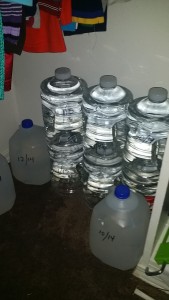



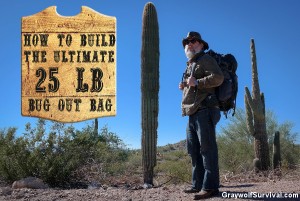
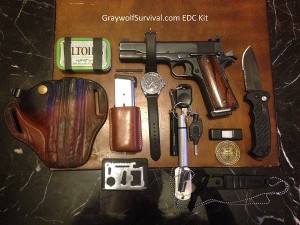
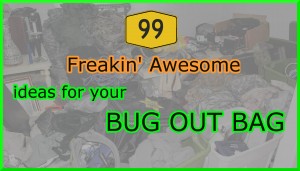
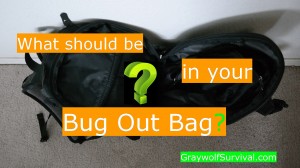

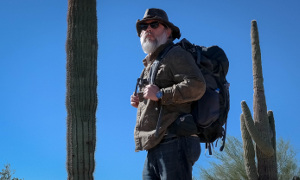
I need a place and I need to know where to go I could go anywhere.
But I don’t want to be in a high or Urban density City like Houston
Non electric tools!
My cordless drill has been a staple of my hand tools and I didn’t realize how much I depend on it. It has a large chuck which I didn’t miss until the drill became in operational due to oldbatteey pack.
I now appreciate corded drillsbut the chuck is much smaller.
Then I remembered my grandfather’s bit and brace. Saves the day.